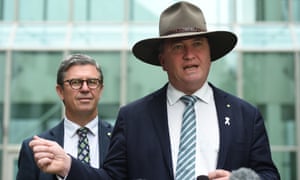Extract from The Guardian
Nationals leader says he would not
oppose taxpayers subsiding the building of new coal-fired plants

Katharine
Murphy Political editor
Wednesday
1 February 2017 19.45 AEDT
The
deputy prime minister, Barnaby
Joyce, says it is “morally prudent” for Australia to build
new coal-fired plants and he would have no problem if taxpayers
provided support.
Joyce
told the ABC that subsidising new coal plants was not on the agenda
right now but, if it emerged on the agenda, “it wouldn’t worry me
in the least.”
Asked
what role the government should play in coal-fired power, Joyce said:
“I think we should be building new coal-fired power stations.”
He
said that, when Australia was the biggest exporter of coal, “it is
morally prudent upon us to be at the forefront of the technology ...
so that poor people can turn on the lights like we do”.
“The
best way to do that is build the plants and investigate ways of
making them as efficient as possible and the more efficient we make
it, the more carbon efficient we make it, now why wouldn’t we want
to do that?”
Joyce’s
comments late on Wednesday followed Malcolm Turnbull opening the door
on the debate during a scene-setting address at the National Press
Club.
As
well as putting a question mark over whether the federal renewable
energy target would
continue in perpetuity, the prime minister lamented the fact
$590m had been spent on clean coal trials and demonstration, yet
Australia lacked a an efficient, low-emissions, coal-fired power
plant with carbon capture and storage.
“Who
has a bigger interest than us? We are the biggest [coal] exporter.
And yet we don’t have one power station that meets those
requirements,” Turnbull said on Wednesday.
The
prime minister declared it was time to develop a technology neutral
approach to the energy market and “strip the ideology out of this
debate.”
The
prime minister said he had also asked two agencies, the Clean Energy
Finance Corporation and Arena (the Australian
Renewable Energy Agency),
to develop a plan for storage that would address the intermittency
problems created by renewable technologies such as wind and solar.
He
said gas was also important to deliver reliable base load power.
Turnbull said he was prepared “to sit down with the states to
determine the right incentives to enable desperately needed
sustainable onshore gas development.”
The
Coalition has entered the new political year determined to make
energy a point of political difference between the Coalition and
Labor, and the prime minister is attempting to position
the Coalition as
the party of lower power prices.
Energy
prices and energy security are hot political issues in South
Australia, which is a heavily contested state in Australian
politics, and the government has also been attempting to push
state governments off their ambitious renewable energy targets.
There
is a campaign on by conservatives to dump the federal RET and climate
politics inside the Coalition will heat up if the US president,
Donald Trump, follows through with a threat to withdraw from the
Paris climate agreement.
The
prime minister has consistently signalled that the government remains
committed to the Paris climate targets regardless of what the US
does.
Before
Christmas, Australia’s
chief scientist, Alan Finkel, warned explicitly that current
federal climate policy settings would not allow Australia to meet its
emissions reduction targets under the Paris agreement.
Finkel
also argued that an emissions intensity scheme – a form of carbon
pricing in the electricity market – was a desirable vehicle to
manage the transition in the electricity market from emissions
intensive sources to low emissions sources.
He
said such a scheme would integrate best “with the electricity
market’s pricing and risk management framework” and “had the
lowest economic costs and the lowest impact on electricity prices”.
The
government has ruled out an intensity scheme, despite having credible
evidence that such a scheme would allow Australia to conform with our
international emissions reduction commitments, with the least impact
on household power bills.
The
Climate Institute’s chief executive, John Connor said on Wednesday:
“It is clear that ultra supercritical coal, without carbon capture
and storage, won’t cut it in modernising and decarbonising our
electricity system.
“Its
emissions are still higher than gas and analysis by business groups
shows there is no economic reason to invest in this technology,
absent significant government subsidy.”
After
the prime minister’s press club speech, the treasurer, Scott
Morrison, declined to rule out providing taxpayer support for a lower
emissions, coal-fired power plant.
“If
we are talking about next generation, new generation technologies
that provide lower emissions energy production, whether it is coal or
whether it is wind or whether it is any of the other sources, why
would you limit yourself to a particular resource and that is the
question the prime minister was putting today,” Morrison told Sky
News.
Morrison
said it was not acceptable to see power plants close “with nothing
on the other side”.
“Obviously
there needs to be transition arrangements and there needs to be a
greater acceptance of the many other alternatives that are out
there.”
Pressed
on whether the government was prepared to provide taxpayer support,
Morrison said: “We need to have an energy future that is inclusive
of what has been one of our greatest energy advantages for 100
years.”
No comments:
Post a Comment